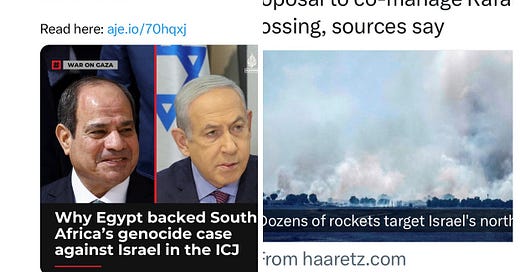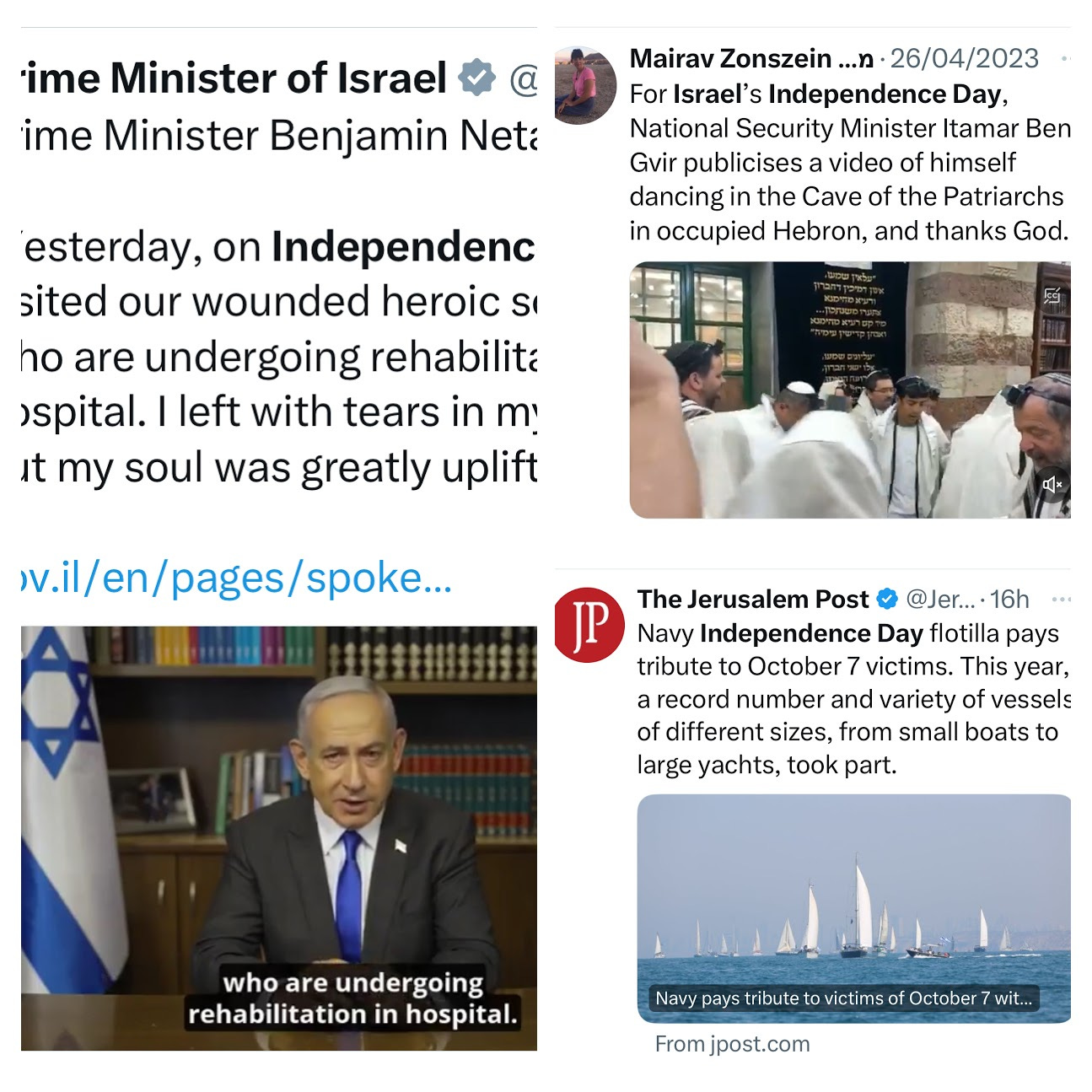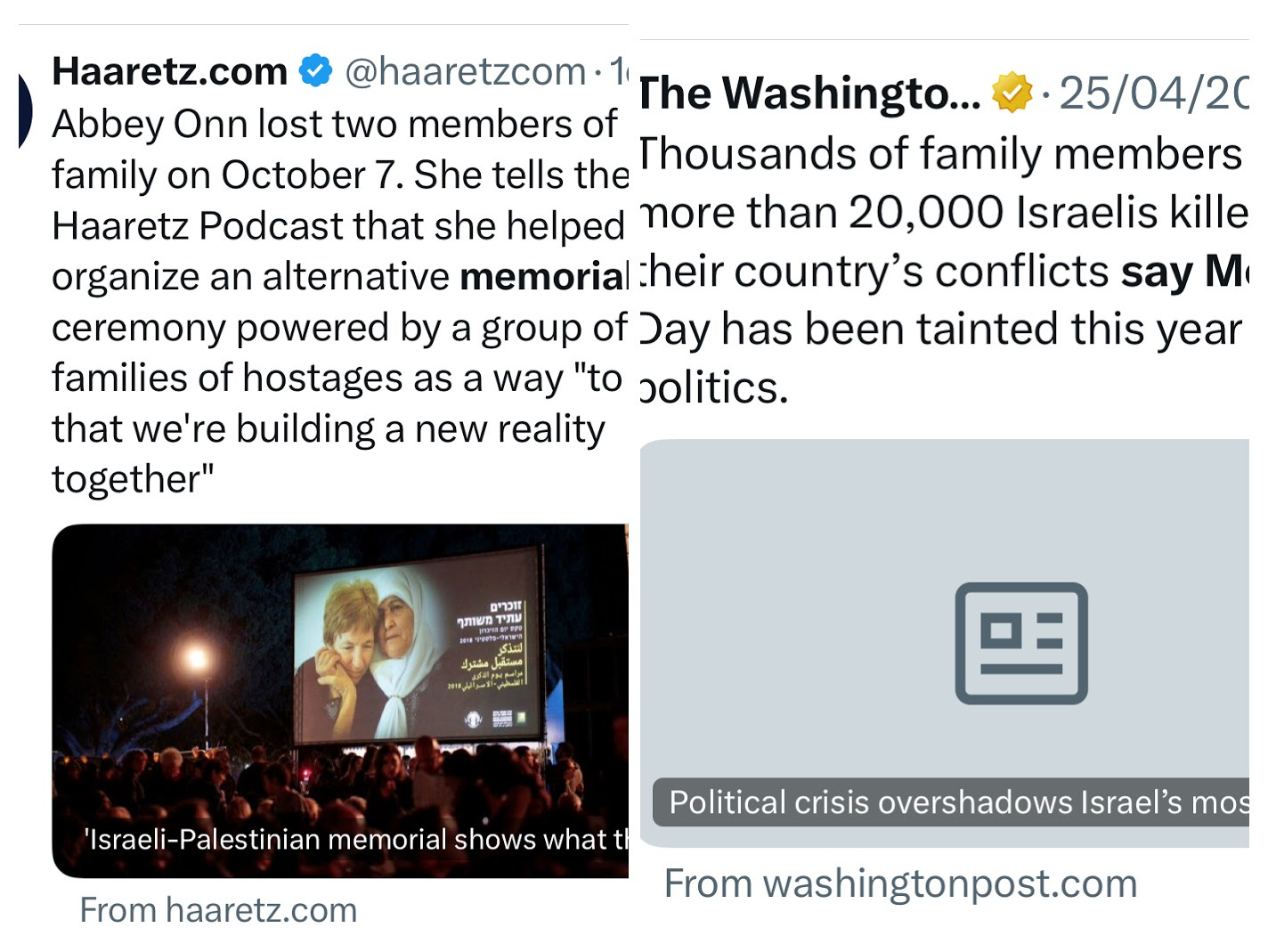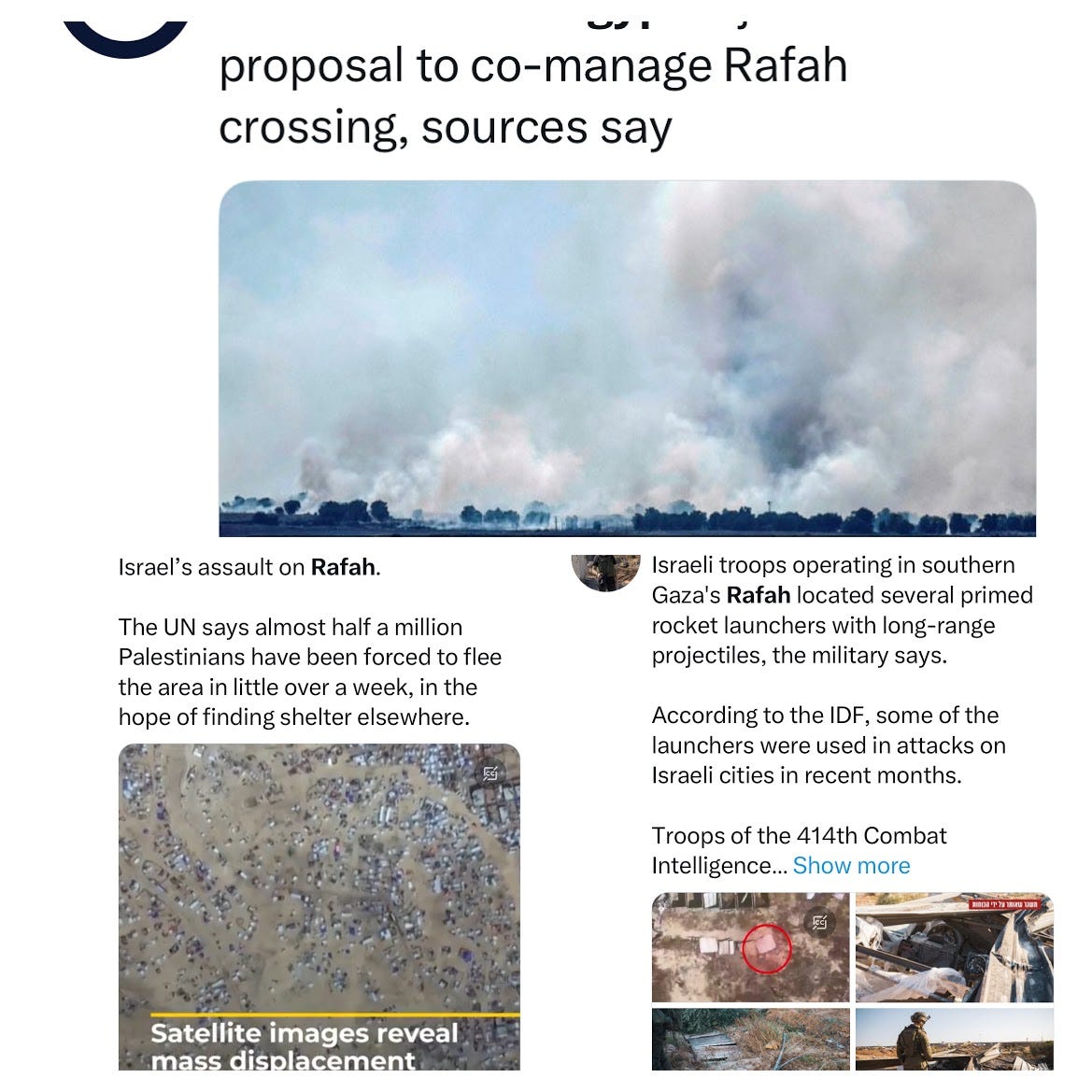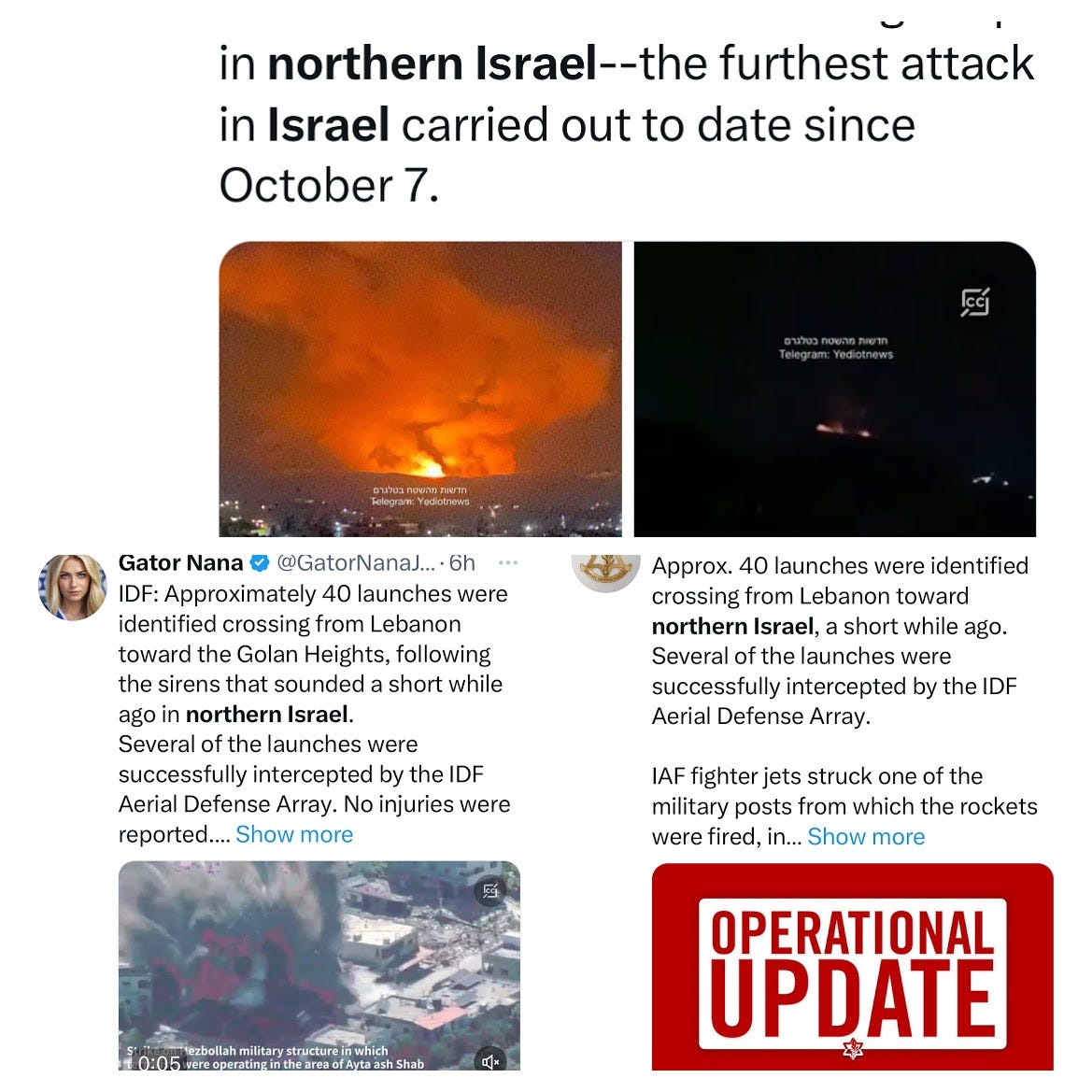Israel at War - Day 224
1. Deterioration in Diplomatic Relations Between Israel and Egypt
Egypt declared that it will no longer enable the transport of humanitarian aid to Gaza. The Egyptians are angry at Israel for taking control over the border between Gaza and Egypt and for the military campaign in Rafah, the southernmost Gazan Strip town on the border with Egypt. They expressed a real fear that Israeli forces will push the Palestinians who found refuge in Rafah into Egypt.
Egypt has been a strategic partner for Israel since the peace agreement that was signed in March 1979 in the White House. Egypt was the first Arab country that signed a peace agreement with Israel, in exchange for all the territory, the Sinai peninsula, that was occupied by Israel in 1967. Egypt was a strategic partner that helped Israel manage the blockade of Gaza for many years.
Now Egypt threatens to halt some of the cooperation with Israel. If that happens, it will put in jeopardy some of the joint interest commitments between the two countries. Egypt is also a highly functional participant in the negotiations to release the 132 Israeli hostages who are still held in Hamas captivity in Gaza since October 7th.
2. Israel Marks a Somber 76th Independence Day Amidst War and Internal Divisions
Independence Day, (Yom Ha’atzmaut יום העצמאות) traditionally celebrated by musical performances, fireworks, and open-air picnics with barbecues and outdoor parties, was somber this year, reflecting deep rifts within Israeli society and the refusal of many Israelis to celebrate during a state of war while 132 men, women and children are still held hostage by Hamas.
Independence Day celebrations traditionally commence with the annual torch lighting ceremony at Mt. Herzl, accompanied by military drills, dance and music performances, and speeches in front of a live audience. This year’s ceremony was pre-recorded with no audience, due to concerns of possible disruptions and protests from anti-government protestors.
In parallel to the ceremony in Jerusalem, families of hostages and their supporters held a “torch-dousing” ceremony at the Shuni Amphitheater, north of Tel Aviv, calling to “extinguish” the government’s neglect, hubris and indifference, and light the torch of hope. More than 1,500 supporters attended the ceremony and tens of thousands more watched it in rallies across the country. Several national news channels aired parts of the alternative ceremony as well, simultaneously with the traditional ceremony, in a split screen. Tens of thousands gathered at the Hostage Square in Tel Aviv, to support the hostages’ families.
Several official events occur annually on Independence Day, including the Israel Prize Award ceremony, the international bible quiz, and the honoring of IDF soldiers who excelled in their line of duty. PM Netanyahu was absent from the Israel Prize ceremony and the bible quiz, raising rumors about his fear of public protests.
The Israel Prize ceremony was held at the southern city of Sderot, near the Gaza border. Of the fourteen prize recipients, twelve were men, and only two were women. All recipients were Jewish.
3. Israel Commemorates Memorial Day Amidst War
This week, Israel marked Memorial Day in the shadow of the ongoing war in Gaza and the escalation on the northern border, in remembrance of more than 30,000 fallen soldiers and civilian victims of hostile acts. With 766 soldiers, and 834 civilians killed since last Memorial Day, this year’s Memorial Day was especially tense. This is the largest number of soldiers killed in one year since the Yom Kippur War of 1973.
Earlier in the week, on the eve of Memorial Day, the 19th joint Israeli-Palestinian alternative memorial ceremony was broadcast online, with 20,000 viewers in Israel, the PA and around the world. The ceremony featured Israeli and Palestinian bereaved family members and peace activists.
Memorial Day events commenced with a one-minute siren at 8 pm on the eve of Memorial Day, followed by the annual formal ceremony at Mount Herzl military cemetery. The following day, at 11 am, after a two-minute siren, the main formal memorial ceremony was held at Jerusalem’s Mount Herzl. At the ceremony, PM Netanyahu said: "We will realize the goals of victory, and at the center of them is the return home of all our hostages, but the price we pay is very heavy." Defense Minister Gallant said at the ceremony that the war in Gaza "will shape our lives for decades to come." Many in the audience left the ceremony in protest during PM Netanyahu's speech.
In a somber reckoning, Shin Bet chief Ronen Bar said in a ceremony at the agency’s headquarters: "We all feel that we failed to provide the people of Israel on October 7 the security blanket we have always been proud of. We all feel the mistake, the feeling that we could have prevented it."
Despite pleas from bereaved families for government ministers to avoid attending memorial services, at military burial plots in cemeteries around the country, verbal disputes and exchanges erupted during the visits of ministers. Far-right National Security Minister Itamar Ben-Gvir attended Memorial Day at the Ashdod military cemetery where he was met with calls from bereaved families: “Get out of here, criminal. Trash, you didn't serve in the army for a minute." Defense Minister Yoav Gallant spoke at the military cemetery in Tel Aviv, where some in the crowd held signs "Their blood is on your hands." PM Netanyahu was heckled during his speech on memorial day, by bereaved parents.
4. Crisis In PM Netanyahu’s Government on the Issue of Gaza, the Day After the War Ends
Defense Minister, Yoav Gallant, posted a statement in which he strongly criticized PM Netanyahu for not having an exit plan for the war. PM Netanyahu has refrained from discussing and deciding who will control Gaza when the war ends. Gallant declared that he would not allow Israel to establish military governance in Gaza, as this would cause more casualties among Israeli soldiers, and that he would not allow Israel to be involved in managing the civil life in Gaza. Since the beginning of the war, PM Netanyahu has not expressed what he has in mind in terms of the day after the war ends, for which body will control Gaza. PM Netanyahu keeps declaring that Israel must eliminate Hanas and that he will not allow any control of Hamas in Gaza, nor will he allow the Palestinian Authority to govern Gaza. On the other hand, he has not stated who can control Gaza, and how to establish an entity that would be able to take responsibility for 2.1 million people, if and when Israel eliminates Hamas. Meanwhile, Hamas militants are regaining their power in places that Israel has already cleared and operated in.
Hamas has also managed to regain its ability to renew the shelling of southern Israel. Most of the communities that were evacuated on October 7th and have returned home are now undergoing the same security instability, as during the years before the war started. That reflects the failure of the military operation in Gaza to eliminate the threats from Hamas toward the Israeli towns and villages on the border.
5. Israeli Government Extends the Displacement of Northern Communities Until End of December 2024
Israel doesn’t have a plan for ending the escalating violent conflict with the Lebanese Islamic Organization Hizbollah. There is constant escalation in the conflict, and the toll in human lives and damage to properties grows on a daily basis. In the last few days tens of rockets were fired towards Israel. On Thursday afternoon Hizbollah escalated further by using a drone to fire two missiles at an Israeli military post wounding three soldiers, one of them seriously.
Hizbollah, a militant organization based in Lebanon started shelling and launching attack drones towards northern Israel right after the October 7th attack by Hamas on southern Israel, and the accompanying massacre of more than 1,200 people. Hizbollah decided to stand with Hamas and started daily shelling of communities in northern Israel. All the communities were evacuated shortly after the October 7th attack, and their inhabitants have been displaced in Israel since then, without any certainty when they will be able to return to their homes, and under what conditions. Tens of thousands of people are displaced, roaming between hotels and temporary homes, not having any plans for their future. Meanwhile there are casualties among soldiers and civilians from the continual Hizbollah attacks.
The announcement that their displacement would be extended at least until the end of the year, fifteen months after October 7, was devastating for them. On Tuesday, Independence Day, mayors and residents of those communities demonstrated and demanded from the government a focused plan on how and when they will be able to return safely to their homes and farms.
To our readers: Please note that we embed links to further details/articles behind the summaries for each item. You can see the links by their blue color and, if you are interested in further details, you can click on the link to access the relevant article/s.

